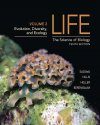About this book
From its first edition, Life: The Science of Biology has set the standard for experiment-based introductory biology texts. There is no stronger textbook for helping students understand not just what we know (scientific facts), but how we know it (the experimental process that leads to their discovery).The new edition of Life: The Science of Biology builds upon this tradition, teaching fundamental concepts and showcasing significant research while responding to changes in biology education...
- Pedagogically, with features that match the way students learn today, including chapter opening stories, art with balloon captions, and new Learning Objectives
- Scientifically, with a wealth of important new research throughout (see Table of Contents for highlights)
- Technologically, with instant access QR codes printed in the text, new interactive features (media clips, chapter summaries, a flashcard app), and a dramatically enhanced BioPortal, with the adaptive quizzing system, LearningCurve
- Quantifiably, with completely revised assessment resources and new ways of measuring students' progress
Volume 2: Evolution, Diversity and Ecology contains only chapter 1-20 of the tenth edition of the main work, making it perfect for shorter courses which focus on the evolution, biodiversity and ecology.
Contents
Part VI: THE PATTERNS AND PROCESSES OF EVOLUTION
Mechanisms of Evolution
Reconstructing and Using Phylogenies
Speciation
Evolution of Genes and Genomes
The History of Life on Earth
Part VII: THE EVOLUTION OF DIVERSITY
Bacteria, Archaea, and Viruses
The Origin and Diversification of Eukaryotes
Plants without Seeds: From Water to Land
The Evolution of Seed Plants
The Evolution and Diversity of Fungi
Animal Origins and the Evolution of Body Plans
Protostome Animals
Deuterostome Animals
Part X: ECOLOGY
Ecology and the Distribution of Life
Population Ecology
Species Interaction and Coevolution
Community Ecology
Ecosystems and Global Ecology
Biodiversity and Conservation Biology
Customer Reviews
Biography
David Sadava, is the Pritzker Family Foundation Professor of Biology, Emeritus, at the Keck Science Center of Claremont McKenna, Pitzer, and Scripps, three of The Claremont Colleges. In addition, he is Adjunct Professor of Cancer Cell Biology at the City of Hope Medical Center. Twice winner of the Huntoon Award for superior teaching, Dr. Sadava taught courses on introductory biology, biotechnology, biochemistry, cell biology, molecular biology, plant biology, and cancer biology. For the past 15 years, he has investigated multi-drug resistance in human small-cell lung carcinoma cells with a view to understanding and overcoming this clinical challenge, and his current work focuses on new anti-cancer agents from plants and fungi.
David Hillis, University of Texas, USA David is the Alfred W. Roark Centennial Professor in Integrative Biology and the Director of the Center for Computational Biology and Bioinformatics at the University of Texas at Austin, where he also has directed the School of Biological Sciences. He has taught courses in introductory biology, genetics, evolution, systematics, and biodiversity. His research interests span much of evolutionary biology, including experimental studies of evolving viruses, empirical studies of natural molecular evolution, applications of phylogenetics, analyses of biodiversity, and evolutionary modeling. He is particularly interested in teaching and research about the practical applications of evolutionary biology.
H. Craig Heller is the Lorry I. Lokey/Business Wire Professor in Biological Sciences and Human Biology at Stanford University. He is a recipient of the Walter J. Gores Award for excellence in teaching. His research is on the neurobiology of sleep and circadian rhythms, mammalian hibernation, the regulation of body temperature, the physiology of human performance, and the neurobiology of learning. Dr. Heller has done research on a huge variety of animals and physiological problems ranging from sleeping kangaroo rats, diving seals, hibernating bears, photoperiodic hamsters, and exercising athletes.
May Berenbaum is the Swanlund Professor and Head of the Department of Entomology at the University of Illinois at Urbana-Champaign. She has taught courses in introductory animal biology, entomology, insect ecology, and chemical ecology and has received awards at the regional and national level for distinguished teaching from the Entomological Society of America. Her research addresses insect-plant co-evolution from molecular mechanisms of detoxification to impacts of herbivory on community structure. Concerned with the practical application of ecological and evolutionary principles, she has examined impacts of genetic engineering, global climate change, and invasive species on natural and agricultural ecosystems.




































